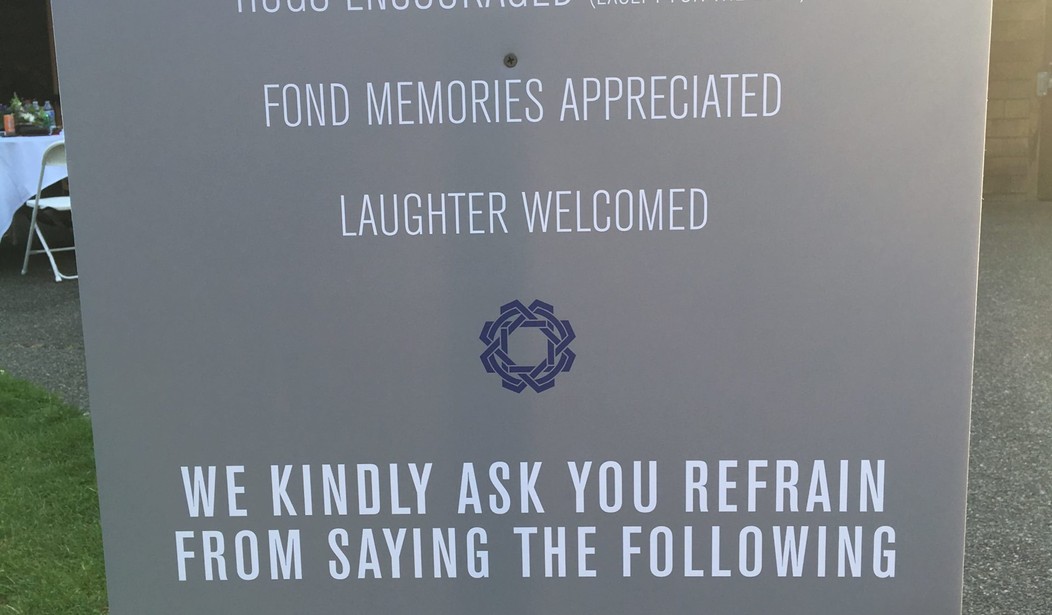From the atheist subreddit this week:
My newly widowed friend told me she was so weary of all her religious family members telling her that her deceased husband was in a better place, that she was going to get a sign telling them to stop. I thought she was kidding…
Let me begin by stating the obvious: funerals and memorial services are prime breeding grounds for trite slogans and awkward conversations. When someone has lost a loved one, whether the death was expected or sudden, there’s not much anyone can say in the moment that will help the grieving family members to get through those first awful days. More often than not they’re going through the motions—making funeral arrangements, picking at food that people keep handing them, and forcing themselves to make polite conversation with people who say things like “I’m sorry for your loss” and “it’s hard now, but it will get better” and the old standby “he’s in a better place.”
I can understand how that last one would rankle an avowed atheist who believes that there’s nothing after this life—all consciousness ceasing, the body rotting in the ground. Perhaps if an individual’s life was filled with suffering and pain, an unconscious death might be preferable to life, but in most cases, humans have an instinctive drive to cling to life and would prefer it to death, so they don’t really believe the deceased person is in a better place. I don’t mind at all that the widow didn’t want to hear anyone lying about the eternal destiny of her loved one. (More on that in a minute.)
I suspect a lot of people say “he’s in a better place” without really giving it a lot of thought. I’ve heard it from plenty of folks who are not religious at all or who subscribe to the odd cultural Christianity that believes if you’re a “good person” you’ll go on to a better place. By “good person” they generally mean anyone who’s on the right side of Hitler or a child rapist. If someone goes to church on Christmas and Easter and does some charity work now and then, he’s a “good person” who will be “in a better place” when he dies. As long as the good outweighs the bad, you’re in with the “man upstairs,” right?
It all sounds really nice and fair by American standards, doesn’t it? Only it doesn’t square with what the Bible teaches about who goes to “a better place.”
Jesus said,
For the gate is wide and the way is easy that leads to destruction, and those who enter by it are many. For the gate is narrow and the way is hard that leads to life, and those who find it are few.” (Matthew 7:13-14)
In other words, not everyone is getting in—and more people are going to be on the wrong side of a better place than on the right side.
“But I’m a good person!” you say. The Bible disagrees:
None is righteous, no, not one; no one understands; no one seeks for God. All have turned aside; together they have become worthless; no one does good, not even one. (Romans 3:11-12)
And there’s also this: “for all have sinned and fall short of the glory of God.” (Romans 3:23) We’ve all broken God’s laws and fall short of his standards and therefore are on the wide road that leads to destruction—we are all deserving of God’s wrath. (If you disagree, review your thought life for the last week and get back to me.)
While it sounds like all bad news, there’s a way out of this mess:
[All] are justified by his grace as a gift, through the redemption that is in Christ Jesus,whom God put forward as a propitiation by his blood, to be received by faith. This was to show God’s righteousness, because in his divine forbearance he had passed over former sins. It was to show his righteousness at the present time, so that he might be just and the justifier of the one who has faith in Jesus. (Romans 3:24-26)
Propitiation means the turning away of God’s wrath. Because God loved the world, he sacrificed Jesus, his sinless son—God in human flesh, actually—to take the punishment for the sins of all who have faith in Jesus. They have forgiveness of sins and the promise of eternal life in “a better place”—a place where there there will be no suffering, pain, or tears. And they’re spared the eternal punishment of those who are on the “wide road that leads to destruction.”
The message above from the atheist is a good reminder that we need to be thoughtful and intentional about the words we use to comfort those left behind. The words “he’s in a better place” are fraught with meaning and should only be said in situations where they’re appropriate. It’s a hard truth that not everyone goes to heaven—even harder when someone we love is in that situation. In most cases, a funeral or memorial service is not the appropriate time or place to share with someone that the person they just buried may be in hell. But it’s also not a time to give someone false hope or to lie about what God’s word clearly tells us about life, death, and salvation.











Join the conversation as a VIP Member